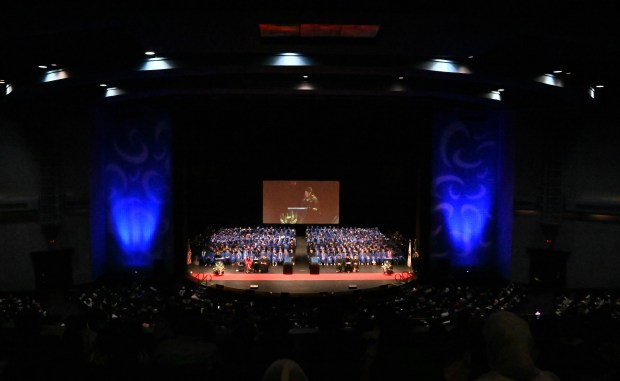Planting trees in Waukegan to reduce the city’s carbon footprint, retard climate change and make the community more attractive is an ongoing effort receiving a boost from both a new countywide program and a grant from Trees Forever, a not-for-profit organization.
More than three years ago, the city received 125 trees from Openlands with 100 going free to residents willing to plant them on their property and take care of them.
Waukegan High School’s Environmental Club sold 384 trees two years ago to more than neutralize the Washington campus’ carbon footprint, and earned a national award from the U.S. Environmental Protection Agency.
Now Waukegan will receive 130 of the 403 native trees going to six governmental entities as part of the Lake County Tree Planting program, as well at least 40 more through the grant from Trees Forever.
Lake County and Waukegan officials planted the first of the 403 trees Monday on Montesano Avenue near the Robert McClory Bike Path, just east of Jack Benny Middle School in Waukegan, initiating a three-year program.
After the officials filled part of the hole for the first tree, workers hired by the county completed the task and planted two more along Montesano Avenue.
Waukegan Mayor Ann Taylor said the project highlights the county’s commitment to sustainability and the environment. It is part of a greater Lake County Tree Initiative, which aligns with the city’s overall arbor effort.
“We are not only prioritizing the planting of trees, but also raising awareness about community and urban forestry,” she said. “This is not just a matter of beautification, but takes the steps necessary to create a greener and more stable future for the generations to come.”
Planting trees around the community, expanding the tree canopy and providing shade has a tradition for Lake County Board member Diane Hewitt, D-Waukegan. She said she led an effort to plant trees 20 years ago at John Clark Elementary School in Waukegan.
“I looked the other day to see if they are still there,” she said. “Those that are are providing shade to the playground area,” Hewitt said.
County Board member Paul Frank said the remaining 273 trees will be distributed to the Park District of Highland Park, Hawthorn Woods, Antioch Township, Lindenhurst and the Vernon Hills Park District.
Frank said the deadline for the second round of grants from the county to other governmental bodies is Oct 15. More than 1,000 new trees will be planted by the end of next year. The entities should let the county know how it will help the community, including stormwater management.
Of the money going to fund the initiative, Frank said $2.5 million was allocated from federal COVID relief funds awarded to the county as an infrastructure project to enhance sustainability, including cleansing the water supply.
“The additional green space from trees allows stormwater to be absorbed into the trees’ deep root systems filtering out pollutants, while also limiting the amount of runoff into sewers, streams and rivers, leading to cleaner water,” Frank said.
County Board member Jessica Vealitzek, D-Hawthorn Woods, said the program will diversity the county’s tree canopy with 26 varieties of native trees. They will also improve air quality by releasing oxygen and removing carbon dioxide. It reduces the impact of urbanization.
“An increased tree canopy provides shade that can also break up heat islands, which are areas in urban spaces that experience higher temperatures because of buildings and roads, resulting in cities cooling down by up to 10 degrees when new trees are planted,” she said.
Along with the 130 trees coming from the county, Niya Simone, Waukegan’s public relations specialist, said at least 40 more are being supplied from a grant provided by Trees Forever, further enlarging the city’s tree canopy.
Emily Ehley, Trees Forever’s Illinois program manager, said its $!5,000 grant to Waukegan is among several going to disadvantaged communities in the state. She said Waukegan qualifies, but did not give specific statistics. The trees are bound for a variety of public places.
In conjunction with the large increase in new trees, Simone said the city is looking for tree ambassadors to assist with the overall effort. They will assist planting trees, as well as become part of the maintenance program.
“They walk the areas of the newly planted trees to assist the city with monitoring the trees’ health, and notify public works if a tree needs attention, like watering, pruning or if there is disease,” Simone said.



